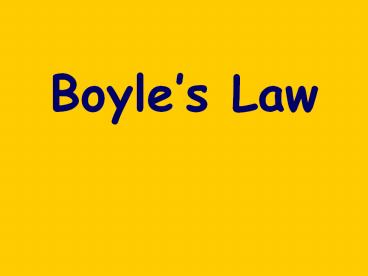Boyle - PowerPoint PPT Presentation
Title:
Boyle
Description:
Boyle s Law What is Boyle s Law? Boyle s Law is one of the laws in physics that concern the behaviour of gases When a gas is under pressure it takes up less ... – PowerPoint PPT presentation
Number of Views:396
Avg rating:3.0/5.0
Title: Boyle
1
Boyles Law
2
What is Boyles Law?
- Boyles Law is one of the laws in physics that
concern the behaviour of gases - When a gas is under pressure it takes up less
space - The higher the pressure, the smaller the volume
- Boyles Law tells us about the relationship
between the volume of a gas and its pressure at a
constant temperature - The law states that pressure is inversely
proportional to the volume
3
How can we write Boyles Law as a formula?
- Pressure is inversely proportional to the volume
and can be written as - Pressure a 1/volume
- Ppressure in N/m2
- Vvolume in dm3 (litres)
- kconstant
- This is more usually written as
- Pressure constant
- volume
- PVk
- P1V1P2V2
4
How can we investigate Boyles Law?
- When investigating Boyles law a given volume of
gas is sucked into a cylinder and the end is
sealed - The temperature of the gas is kept constant
- Using several equal weights we can apply
increasing pressure to the gas - We can calculate the pressure by dividing the
force applied by the area of the top of the
cylinder - The volume will be shown on the scale on the
cylinder
5
Boyles Law apparatus
6
Below are some results of an experiment
- Calculate pV (pressure x volume) for each set of
results. What do you notice?
7
What these experimental results show
- The pressure x volume for each set of results
remains constant - This is called Boyles Law
- For a fixed mass of gas, at constant temperature,
pV constant or - P1 x V1 P2 x V2
- Let us look at the results again
8
Here are the results of the experiment
- Did you notice that if p is doubled, V is halved?
- If p increases to 3 times as much, V decreases to
a 1/3rd . This means - Volume is inversely proportional to pressure, or
- V ? 1
- p
9
What sort of graphs would this data give?
- If we plot volume directly against pressure we
would get a downwards curve showing that volume
gets smaller as the pressure gets larger, and
vice versa.
10
Another way of plotting the data
- Curved lines are hard to recognise, so we plot
the volume against the reciprocal of pressure
(ie. 1/p) - This time the points lie close to a straight line
through the origin. - This means volume is directly proportional to
1/pressure or - volume is inversely proportional to pressure
11
This leads us back to Boyles Law
- Boyles Law for a fixed mass of gas kept at
constant temperature the volume of the gas is
inversely proportional to its pressure.
12
Problem
- A deep sea diver is working at a depth where the
pressure is 3.0 atmospheres. He is breathing out
air bubbles. The volume of each air bubble is 2
cm2. At the surface the pressure is 1 atmosphere.
What is the volume of each bubble when it reaches
the surface?
13
How we work this out
- We assume that the temperature is constant, so
Boyles Law applies - Formula first P1 x V1 P2 x V2
- Then numbers 1.0 x 2 3.0 x V2
- Now rearrange the numbers so that you have V2 on
one side, and the rest of the numbers on the
other side of the equals symbol.
14
Heres what you should have calculated
- V2 3.0 x 2
- 1.0
- therefore volume of bubbles 6 cm3
- Note that P1 and P2 have the same unit, as
will V1 and V2
15
This powerpoint was kindly donated to
www.worldofteaching.com http//www.worldofteac
hing.com is home to over a thousand powerpoints
submitted by teachers. This is a completely free
site and requires no registration. Please visit
and I hope it will help in your teaching.












![⚡[PDF]✔ Robert Boyle: A Free Enquiry into the Vulgarly Received Notion of Nature PowerPoint PPT Presentation](https://s3.amazonaws.com/images.powershow.com/10047373.th0.jpg?_=20240604107)


















